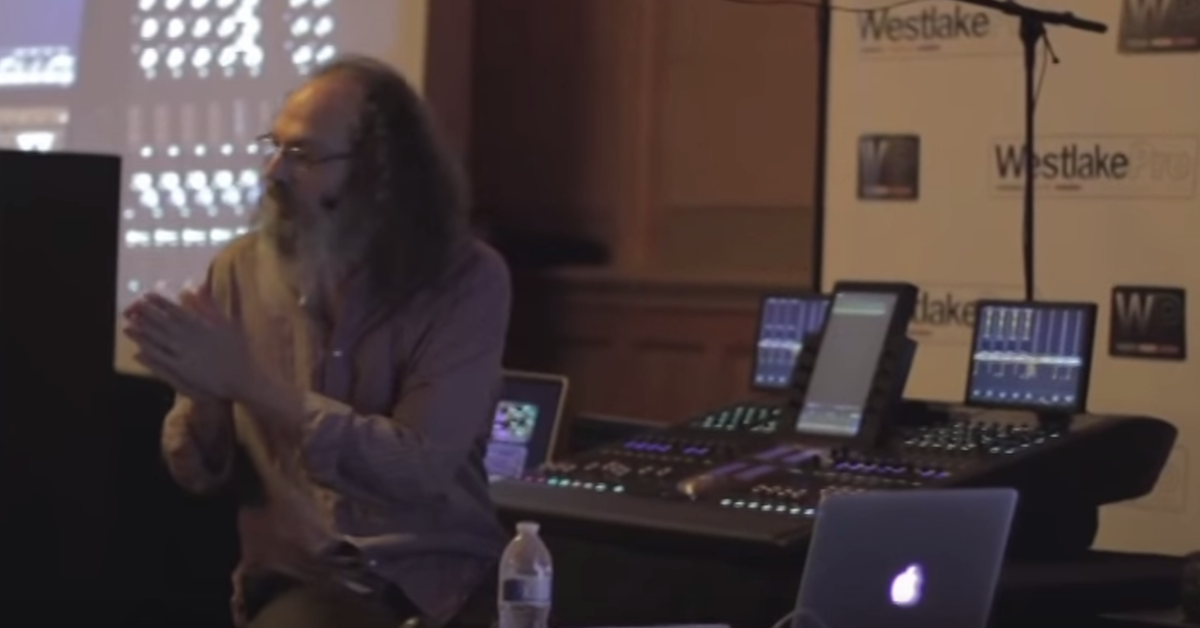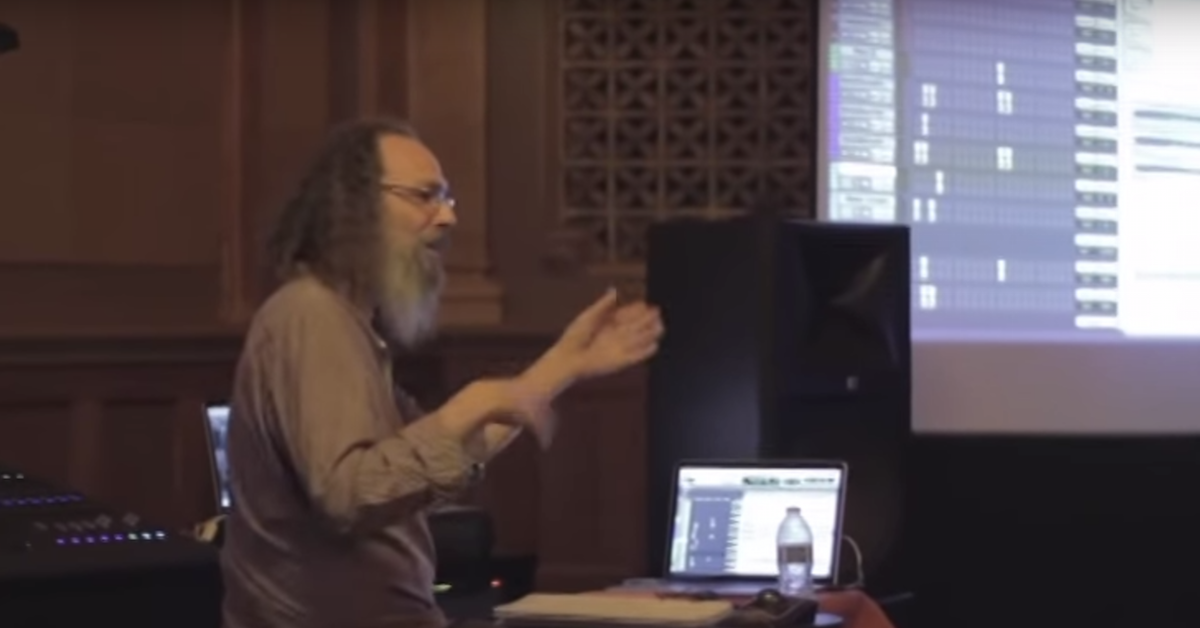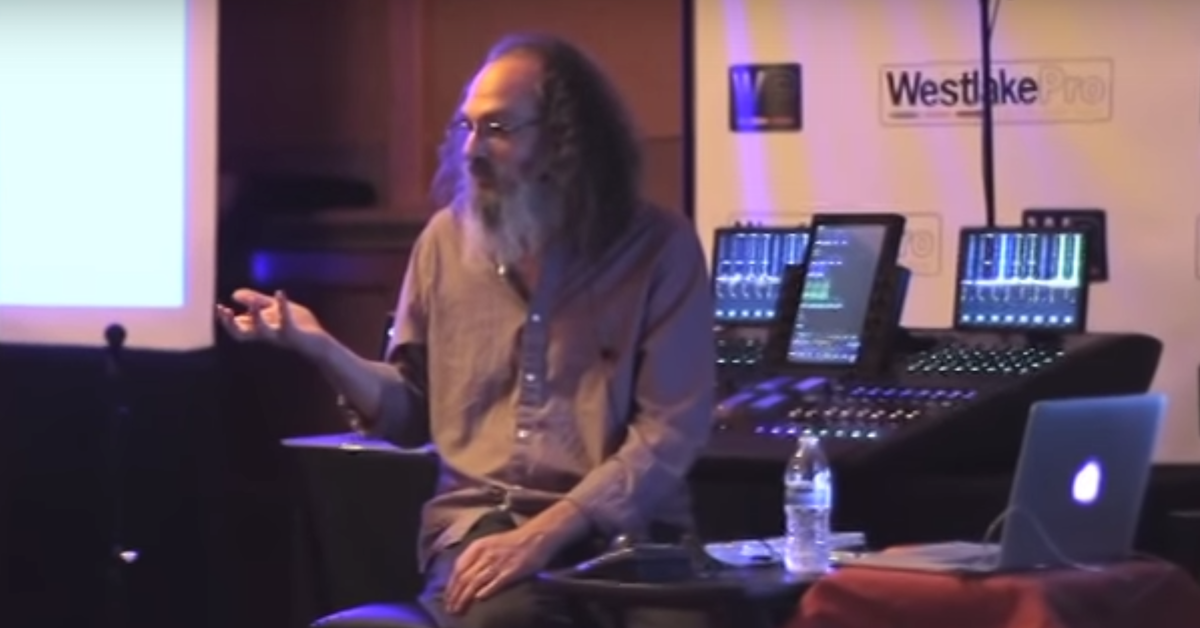Mixing Masterclass with Andrew Scheps — Part 10
So when you’re starting out mixing, you focus on your low end, like, “oh my god, I have to get my low end right.”
I never think about my low end anymore, because the low end affects how the vocal works. If the low end is wrong, then it’s no good, and it could either be a balance, or an EQ thing, or a sub thing, and you kind of know when you go for it, so even mixing in headphones, where I’m not hearing the very bottom, you hear how it affects everything else in the mix and you just kind of know.
On this one, I was super stoked at how much sub there was. That’s awesome, and I had no idea. I knew that there was a bunch going on down there, and I was afraid it was just going to be this huge flabby mess, and instead it was a huge, flabby, good mess, and I could use it.
[someone asks question]
Um, okay, the politically correct answer is I always start with the vocal and have everything in all of the time. The reality is I start with the kick drum.
Okay, generally, I also am a huge fan of getting the rough mix, and I will listen to the rough mix while I’m color coding and things like that. Color coding is a big part of organizing it in my brain, so I know what’s playing, and getting the tracks in the right order, because then, all of a sudden, I’m familiar with it.
So I want to know what every instrument is doing all through the arrangement, and I will know that. Within a couple of hours, I’ll know everything. But the first task if it’s a live rock track is I need to get the drums down to that one fader that I talked about before, and if I haven’t gone through every single stupid microphone that they didn’t combine on the way in, and they didn’t cut the toms, and I’ve got spot mics in the cymbals and overheads, and four sets of room mics, and three mono crush mics, and if I don’t know what they’re all doing and balance all of that first, I can’t even listen to the vocal. I have no idea what’s going on.
So knowing what sort of track it is, I’ll get the drums close. The other thing is again, I think from having mixed so many things, I can get the drums close without hearing the other stuff, and I usually don’t have to go back and change it too much. Usually, I’ll be changing the balance of the kit, not the EQ. I’ll never have the kick drum sounding awesome, and then put the bass in and go, “Alright, that’s not going to work.”
I’m lucky that doesn’t happen anymore, and I think that’s just from getting used to the way stuff sounds. So I will work my way through every instrument, sometimes all of them in solo, just to see like, “What the hell is that?”
But that said, in terms of actually mixing the song, the balance is very organic, and everything is in, and if I can’t make it work, then I’ll start taking stuff out, and if I get it to work with stuff out, then that stuff has to really convince me it needs to be in the mix, or else I take it out, and I send a really apologetic e-mail to the band saying, “I kind of messed around with your arrangement,” or I’ll add stuff.
You know, I mixed a song a few weeks ago where the verse didn’t have any bass, and it really needed bass, and I played bass, and I said, “I’m sorry that I played bass on your verse,” and they never even commented, so obviously, it’s what made it work.
It’s only about making the song work. At the end of the day, that’s it, and it’s cool if someone also says, “Yeah, and it sounds great.” Most of my mixes do not sound great, but hopefully, they’re exciting and fun to listen to, and you want to listen again, and there’s nothing about them that really pains you.
If I — that’s my threshold. If nothing pains you, then I’ve succeeded, but it really and truly is about the song, so that’s the getting all the instruments in, but at the very beginning, you have to make each of those instruments act as if they’re each on one track, like a mono drum, mono bass, mono guitars, even though they happen to be stereo and made up of 60 things.
So long answer, again.
[someone asking question]
No, it’s totally random and bad. It’s another thing — I mean, when I was mixing on a console, there are definitely levels at which things start to sound different, and it’s part of why my mixes were so loud, because the Neve would get awesome, and then it would break, and you had to push it to the awesome place, and that awesome place happened to be really, really, really loud, and then you could break it.
So it turns out for me, anyway, the summing in Pro Tools works exactly the same way. It doesn’t sound right to me until my mix is a certain level, and that level can come from the 2mix or whatever, but to answer your question in a practical way, I’ve got VCAs. There is usually no track in the session that is a source track that’s not controlled by a VCA. Sometimes it’ll be five VCAs that control everything, sometimes it’ll be 15.
Like, the Ziggy Marley sessions, usually there’s bass VCA, drums VCA, percussion VCA, maybe two horn VCAs, guitar VCA, keyboard VCA, lead vocal VCA, background vocal VCA. So that’s normal. That’s my VCAs. And then I’ve got a VCA that controls all of the VCAs. So a group of the VCAs. And that’s where all of my gain staging comes from.
So I usually start with all of those VCAs at minus three or something like that, leaving the tracks however they came up, because that was the balance other people were used to, and then that master VCA can pull down from there, so if I really liked the balance, I don’t have to go through and, “Oh, what was I at, subtract 2.3 dB from every one,” I just take my master down 2.3.
That’ll do, looking at that router aux, I’ve got a master on that so I can just see how much I’m blowing it up, and I usually have an L2 on there that’s bypassed, because when you put it in, you’ll see that you’re actually overshooting by like, 19dB.
So I’ll bring it down six and hope for the best, and you know, go like that.
So that is — I do gain staging by using VCAs, but there’s no — there’s no specificity to it. It’s really sort of a random thing that has now become a habit.




